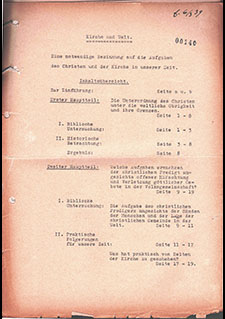Church and World
Various informal groups of members of the University of Freiburg already gathered to exchange views even on political issues before joining together in the so-called Freiburg Circle. Worry about the threat of war looming in September and moral outrage at the November Pogrom provided the impetus for the initial formation of the Freiburg Council in this milieu and on the basis of personal, academic and church ties.
It consisted of Protestant professors and pastors. Catholics joined later. This private circle of likeminded individuals discussed issues of Christian ethics and the reorganization of the state and economy roughly every month until 1944.
Already in the fall of 1938, the historian Gerhard Ritter penned together with Otto Hof and Karl Dürr, both pastors in Freiburg, a roughly twenty-page memorandum entitled “Kirche und Welt. Eine notwendige Besinnung auf die Aufgaben des Christen und der Kirche in unserer Zeit” (Church and World. A Necessary Reflection on the Mission of Christians and the Church in Our Time).
It was a paper on the self-understanding of Christians who felt their religious conscience and their conception of civil law had been troubled by political developments. Certainly, it was also a bit of a substitute for the Confessing Church’s nonexistent protest in response to the November Pogrom.
The gist of the text addressed the issue of the limits of a Christian’s duty of obedience to secular authority in a totalitarian state. The authors felt the limits set by God were reached wherever a violation of divine commandments was called for. They described a Christian preacher’s mission as addressing the call to penance to the national community as a whole and combatting the public spirit of an entire nation’s self-exultation and self-righteousness.
Concretely, the memorandum name three symptoms of the diabolical spirit of human self-righteousness: The demand for unconditional obedience and veneration of Hitler verging on religion, the anti-Semitic attacks and the racism. The memorandum was circulated in Confessing Church circles in southwest Germany but the extent and the response to it cannot be ascertained precisely.
Source / title
- © Landeskirchliches Archiv Karlsruhe, Nachlass Dürr, Bd. 10, Nr. 140

